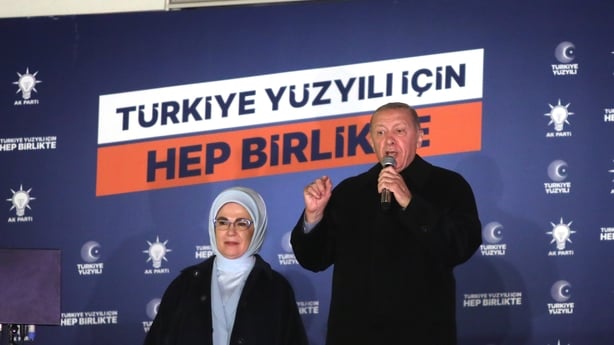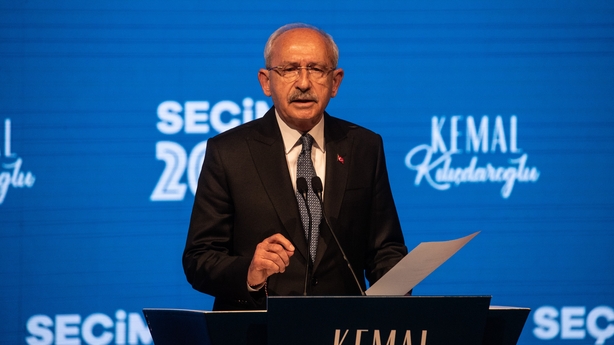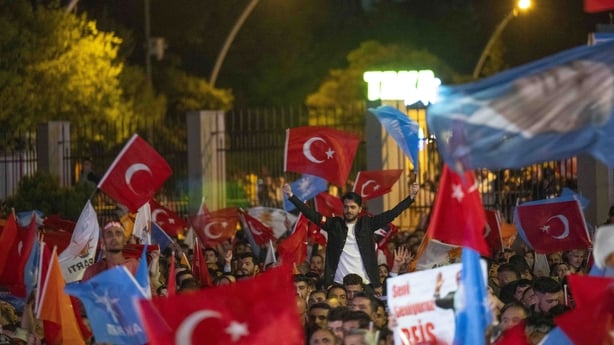EU chiefs Ursula von der Leyen and Charles Michel congratulated Turkish voters on their large turnout in the first round of national elections, hailing this as a win for democracy.
"It's a very clear sign that the Turkish people are committed to exercising their democratic rights to go and vote and that they value the democratic institutions," Ms von der Leyen said.
Mr Michel also congratulated "Turkish citizens" on their turnout, but neither of Brussels top two officials would be drawn on Turkey's long moribund bid for eventual EU membership.
Turkey now faces its first presidential runoff vote after President Recep Tayyip Erdoğan failed to secure a first round re-election in Sunday's national polls.

The 69-year-old nevertheless did better than expected and could extend his two-decade grip on power on 28 May, after neither he nor opposition leader Kemal Kılıçdaroğlu reached the 50% threshold.
Ankara applied to join the European Union in 1987, was declared eligible to begin formal membership talks in 1999 and negotiations began in 2005, only to flounder over the status of Cyprus.

Mr Kılıçdaroğlu's camp had initially contested the vote count and claimed to be ahead.
But the 74-year-old looked slightly despondent as he faced reporters earlier and admitted that a run-off seemed inevitable.
"If our nation says second round, we will absolutely win in the second round," he said.
"The will for change in the society is higher than 50 percent."
The lira fell against the dollar and euro on investor disappointment that Mr Erdoğan's era of unconventional economics may not be over.
Reported turnout approached 90% in what has become a referendum on Turkey's longest-serving leader and his Islamic-rooted party.
Mr Erdoğan has steered the nation of 85 million through one of its most transformative and divisive eras.
Turkey has grown into a military and geopolitical heavyweight that plays roles in conflicts from Syria to Ukraine.

The NATO member's footprint in both Europe and the Middle East makes the election's outcome as critical for Washington and Brussels as it is for Damascus and Moscow.
President Erdoğan is lionised across swathes of conservative Turkey that witnessed a development boom during his rule.
More religious voters are also grateful for his decision to lift secular-era restrictions on headscarves and introduce more Islamic schools.
"The most important thing is that we do not divide Turkey," Istanbul voter Recep Turktan said after casting his ballot.
"We will carry out our duty. I say, go on with Erdogan," the 67-year-old said.
But Mr Erdoğan's first decade of economic revival and warming relations with Europe was followed by a second one filled with social and political turmoil.
He responded to a failed 2016 coup attempt with sweeping purges that sent chills through Turkish society and made him an increasingly uncomfortable partner for the West.
The emergence of Mr Kılıçdaroğlu and his six-party opposition alliance, the type of broad-based coalition Mr Erdoğan excelled at forging throughout his career, gives foreign allies and Turkish voters a clear alternative.
A run-off in two weeks could give President Erdoğan time to regroup and reframe the debate.
But he would still be hounded by Turkey's most dire economic crisis since the 1990s.
Many are still also haunted by the trauma of the government's stuttering response to a February earthquake that claimed more than 50,000 lives.
"We all missed democracy," Mr Kılıçdaroğlu said after voting in the capital Ankara.

Pre-election polls indicated Mr Kılıçdaroğlu would win the youth vote, nearly 10% of the electorate, by a two-to-one margin.
Mr Erdoğan "can build as many tanks and weapons as he wants, but I have no respect for that as long as there is no penny in my pocket," university student Kivanc Dal said.
But others showed unwavering faith in the man who broke half a century of corruption-riddled secular rule.
Nursery schoolteacher Deniz Aydemir questioned how Turkey could be ruled by a coalition of six parties, a favourite attack line of Mr Erdoğan's during the campaign.
"Yes, there are high prices... but at least there is prosperity," the 46-year-old said.
Mr Erdoğan's campaign became increasingly tailored to his core supporters as election day neared.
He branded the opposition a "pro-LGBT" lobby that took orders from outlawed Kurdish militants and was bankrolled by the West.
He also tried to win over state sector workers by giving them massive pay raises in the months leading up to the vote.
Much of the attention will now focus on a little know independent candidate who has turned into a kingmaker by picking up 5% of the vote.
Sinan Oğan was expelled from an ultranationalist party that has since joined forces with Mr Erdoğan and entered the campaign a few months before the vote.
"We will not say if we will support this or that candidate," Mr Oğan said yesterday.
"We will hold consultations with their representatives and then decide," he added.
